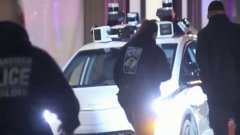
Unidentified flying objects, or UFOs, have captured the imagination of Americans for decades. But much of the conversation has been confined to science fiction movies and novels.
In the absence of government commentary on the topic, conspiracy theories have run rampant. A big one suggests the U.S. has been concealing alien life and technology in secret compounds like Area 51 in Nevada. A 2019 found 68% of respondents believed the U.S. government knows "more about UFOs than it is telling us."
The government is trying to change the narrative. In an attempt to be more transparent and address potential national security questions, Washington, D.C. has taken up the charge to publicize and legitimize the study of unidentified anomalous phenomena, or UAPs, as the military has rebranded UFOs.
"I think they have started to recognize that we should actually have the ability to report these objects, not because we're out there doing some type of UFO hunt, but because it's a matter of national security and domain awareness that the tactical air crew in this country understand what's in front of their aircraft," said Ryan Graves, executive director of the UAP-focused nonprofit Americans for Safe Aerospace.
A former U.S. Navy pilot, Graves also testified before Congress in July, alongside two other former military officials, about his experience with UAPs.
That Congressional hearing followed a flurry of government activity aimed at demystifying UAPs. In June 2021, the Office of the Director of National Intelligence released a preliminary on UAPs, followed in November by the Pentagon establishing a to identify and track objects in restricted airspace.
Then, in June 2022, NASA convened an independent expert panel to help study UAP incidents and advise the Department of Defense on how to gather and interpret data on UAPs. The next month, the DoD the All-domain Anomaly Resolution Office, or AARO, to synchronize efforts across DoD and other federal agencies in detecting and investigating UAP sightings.
Watch the to find out more.




